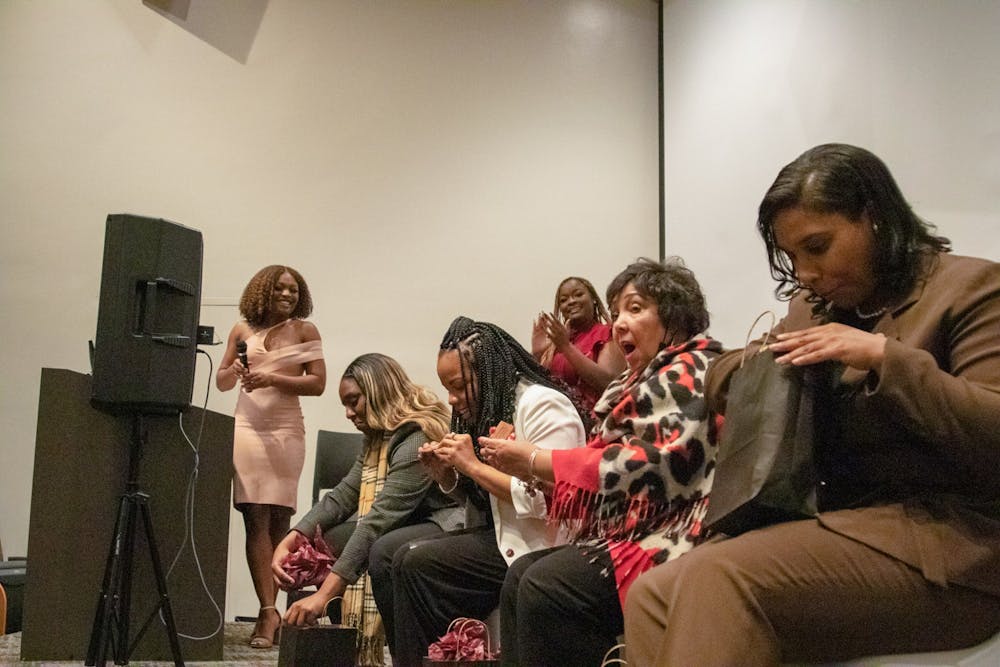The premiere of the documentary film entitled “The Backbone,” created by fourth-year marketing and management student Hannah White, was met with laughter, cheering and a standing ovation at Gambrell Hall on March 18.
The film documents the history of Black women at USC from the time of the university's desegregation in 1963 to the modern day. White and her team, comprised of her two best friends Lyric Swinton and Kendrick Lindsey, as well as White’s mentee Jamara Green, helped interview at least one Black woman from every decade beginning in 1963.
“I really had this in mind for Black women at the University of South Carolina,” White said. “Just something that they can relate to, they can feel like it's theirs. It's ours.”
The film consisted of five chapters that focused on student life, the struggles of Black women at USC, student movements and mentorship.
The story of Black women at USC is a story that hadn’t been told before, according to Scott Trafton, an associate professor who gave White feedback on the film as it was being developed.
“I feel really good right now,” Swinton, a USC alum, said. “I feel like women who haven’t felt seen at this university for a very long time finally felt seen. And I think that was the purpose of the documentary. It was for us, by us.”
"Mind-blown" was how Hazel A. Bridges, who attended USC as an undergraduate from 2011 to 2015, described her reaction to the film. She was interviewed for the film and said she was impressed to see so much history condensed into an hour and 15-minute documentary.
“But to know that your story means something and is meaningful,” Bridges said. “And that you were able to make an impact while you were there at school that is felt even after you’ve left, it was just a beautiful thing to know that someone was interested in my story and wanted to share that.”
Gail Bush Diggs, Class of ‘77, became the second Black Homecoming queen during her time at USC and was interviewed for the film. She said she was harassed and had objects thrown at her by white students when she was crowned.
While it was traditional to receive the crown and the scepter upon winning, the event organizers at the time said she’d get the scepter later. She never got it.
“It makes me feel good to know that we are able to share how things were back in the day,” Diggs said. “But also realize that the more things change, the more things remain the same. You’re seeing a little bit of that these days.”
The idea for the film came from White’s time as student body vice president. During this time, White hosted a “podcast-a-thon,” in which for 12 hours straight she talked to Black alum of USC and listened to their stories.
For six months, the group performed research, brought together B-roll and organized the interviews to create the film.
“You have to like, stay motivated by your why,” White said. “And I think that's what kept us going. So yes, like, every night, we would go to school, come home. And for five, six hours, work on the documentary trying to delegate some tasks. But that was just our life for a long time.”
The film will have a showing at the Russell House Theater on March 24 and another at the Booker T. Washington building on March 29. Trafton also said White is working on getting the film a permanent home, such as the university archives.
A panel discussion was held when the movie finished, led by multiple women featured in the film who shared their experiences at USC. Before they left and the event concluded, though, the four speakers each received a bag with a small brick with "Backbone" enscribed on it.
White said that in a collaboration with the College of Arts and Sciences, each woman featured in the film will get a brick on the Horseshoe.
“I just couldn't imagine anything bigger than myself, than uplifting those that came before me. That's, that's what it means to me,” White said.

